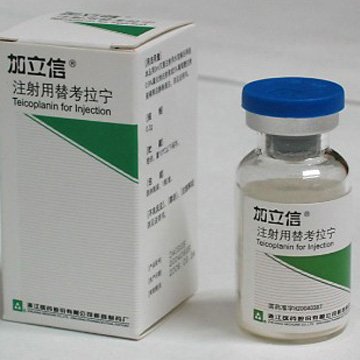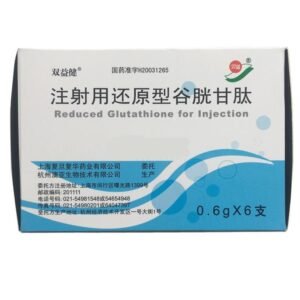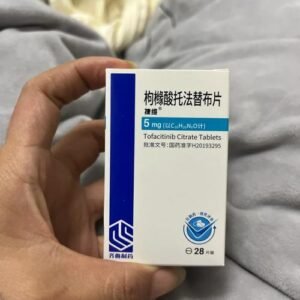Teicoplanin for Injection.
Effects and efficacy: This product is mainly used to treat various serious Gram-positive bacterial infections, including serious staphylococcal infections that cannot be treated with penicillin and cephalosporin antibiotics or that have failed to be treated with the above antibiotics, or staphylococcal infections that are resistant to other antibiotics. Sensitive bacteria include Staphylococcus aureus and coagulase-negative staphylococci (including methicillin-sensitive and -resistant bacteria), Streptococci, Enterococci, Listeria monocytogenes, Corynebacterium, Clostridium difficile, Peptostreptococci, etc. Including lower respiratory tract infections, urinary tract infections, sepsis, endocarditis, peritonitis, bone and joint infections, skin and soft tissue infections, and can also be used as an alternative to vancomycin and metronidazole. Usage and dosage: Teicoplanin can be injected intravenously or dripped intravenously. Drug preparation: Slowly inject 3 ml of water for injection into the bottle containing teicoplanin and gently rotate the vial. Until the powder is completely dissolved, be careful not to produce foam. If foam is formed, place the bottle for 15 minutes until the foam disappears, and completely absorb the liquid into the syringe. The prepared solution can be added to the following injections: 0.9% sodium chloride injection or 5% glucose injection or 5% glucose and 0.9% sodium chloride compound injection or peritoneal dialysis fluid. Determination of serum drug concentration can optimize treatment. Moderate infection in adults and elderly patients with normal renal function: lower respiratory tract infection, urinary tract infection, skin and soft tissue infection. First dose: 0.4g intravenous administration, then maintenance dose: 0.2g, once a day, intravenous administration. Severe infection: bone and joint infection, sepsis, endocarditis, peritonitis, etc. First dose: 0.4g intravenous administration every 12 hours for 3 consecutive times, then maintenance dose of 0.4g, once a day, intravenous administration. Oral administration is used for pseudomembranous enteritis caused by Clostridium difficile, with a dose of 100-500mg, 2-4 times a day, and a course of treatment of 10 days. Adults and elderly patients with renal insufficiency For patients with renal insufficiency, the dose should be reduced from the 4th day. The specific doses are as follows: Moderate renal impairment: For patients with creatinine clearance of 40-60ml/min, the dose should be halved. The original dose can be given every other day, or the original dose can be halved and given once a day. Severe renal impairment: For patients with creatinine clearance less than 40-60ml/min and hemodialysis patients, the dose of teicoplanin should be 1/3 of that of normal people. The original dose can be taken once every 3 days, or 1/3 of the original dose can be used once a day. Teicoplanin cannot be removed by dialysis. Continuous ambulatory peritoneal dialysis: The first dose is 0.4g intravenous administration, followed by 20mg per liter of dialysate in the first week, 10mg per liter of dialysate in the second week, and 20mg per 3 liters of dialysate in the third week. Children’s medication Gram-positive bacterial infections in children over 2 months old can be treated with teicoplanin. For children with severe infections and neutropenia, the recommended dose is 10 mg/kg, the first three doses are intravenously injected once every 12 hours, and the subsequent dose is 10 mg/kg, intravenously or intramuscularly injected, once a day. For moderate infections, the recommended dose is 10 mg/kg, the first three doses are intravenously injected once every 12 hours, and the subsequent dose is 6 mg/kg, intravenously or intramuscularly injected, once a day. Newborns: The recommended dose for infants on the first day is 16 mg/kg, only one dose is used, and then 8 mg/kg is maintained for the next few days, once a day, and the intravenous infusion time is not less than 30 minutes.
Drug contraindications:
Allergic to this product is prohibited. Use with caution during pregnancy and lactation.
Related dosage forms:
Injection
Share:
Products
Our offers
Health Classification
Let us work together to protect precious health




























